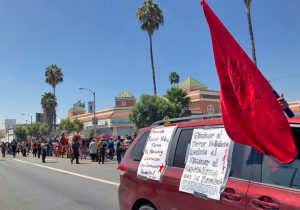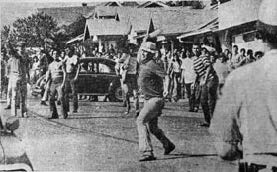Comrade Veterans of Chicano Moratorium Bring Communist Message to 50th Anniversary March

Thirty thousand people gathered in working-class Latino/a East Los Angeles on August 29, 1970. They were protesting a racist conscription and military policy for the genocidal Vietnam War. Soldiers with Spanish surnames (mostly Puerto Ricans and Mexican Americans) were 19% of the US soldiers killed, while these groups were 12% of the US population.
This, while a mass anti-war movement in the streets had spread to mutinies of US soldiers in Vietnam and anti-racist rebellions in Black communities across the US had spread to rebellions in US Army stockades in Vietnam.
Three founding members of the ICWP marched in this “Chicano Moratorium.” They were members of a generation of students, soldiers and workers that fought for communist politics within the massive US anti-war movement.
They marched with 200 Chicano, Black and white workers and students organized by Progressive Labor. This contingent called for “revolution-socialism—as the only answer to the war, racist oppression at home, police terror, crummy jobs, low wages, and every other form of oppression we face at the bosses’ hands.” It put forward “the need to smash racism and nationalism, and to build a fighting, united movement of the whole working class.”
Bilingual signs and banners read: “Smash Racism, the Bosses’ Tool!” “Support All Workers’ Struggles!” and “US Out of Southeast Asia Now! No Deals!” Another 150 people joined the contingent off the sidewalks.
They distributed the PL newspaper, full of articles about anti-war struggles at US Army bases in Washington, California and New Jersey. The paper reported on workers’ struggles against racism and exploitation in factories, schools, and hospitals in the US and around the world,
As marchers sat on the grass in a park afterward, listening to speakers, the LA Sheriffs viciously attacked. While the sell-out nationalist leadership called for people to submit, protestors immediately began to fight back. A battle, starting with rocks and bottles and ending with tear gas, raged in the streets of East Los Angeles all afternoon.
The murderous gang known as the LA Sheriffs killed three workers that day, including journalist Reuben Salazar who had criticized cops and the sheriffs in the LA Times. Two hundred people were arrested.
The nationalists tried to blame the fight on PL. But dozens of cops in formation attacking the crowd proved that this was a plan by the ruling class from the beginning.
August 29, 1970 was the first US rebellion started by an attack on a mass anti-war march. It showed the fear the US ruling class had of the revolutionary potential of workers and youth.
Fifty years later, comrades, including two veterans of the 1970 Moratorium, brought Red Flag to the anniversary march. Our paper explained communist ideas in relation to workers’ struggles and imperialist conflicts worldwide. It called on marchers to join the communist struggle.
These marchers were angry about racist attacks on Latinx and Black workers, including racist police terror and Covid-19 deaths. Signs remembered AJ Weber, killed by sheriffs in 2018, and Andres Guardado, shot in the back by sheriffs this summer.
Today’s march leaders, like those 50 years ago, called for “Chicano Power.” But the nationalist sell-outs of the past have lost their revolutionary cover. They are now the Mexican-American politicians and bureaucrats who run the bosses’ system in East Los Angeles.
We’ve learned a lot in 50 years. Now we know that socialism doesn’t lead to communism. We fight imperialism, racism and nationalism by mobilizing the masses for communism.
Marchers young and old welcomed the participation of ICWP comrades. We had good conversations about communism and the need for revolution. Many saluted our signs. They grabbed all our copies of Red Flag. They are hungry for the working-class unity that workers need to get rid of this murderous capitalist system once and for all.

I was a Teenager during the Chicano Moratorium of 1970
The anti-war movement found me when I was almost fourteen, in middle school in a working-class barrio of Los Angeles, CA. The War in Viet Nam was in full swing, drafting all the young men who had graduated from high school and weren’t in college. Some, only sixteen or seventeen, signed up before finishing school. Many didn’t feel all that connected to “patriotic duty.” But it was considered honorable and “manly” to enlist.
Since 1968, Chicano students – some inspired by the farmworkers’ struggle – had been walking out of high schools against racism. I had marched in a couple of protests at our local high school. I’d heard speeches about the large number of soldiers who were Black and Latino compared with the percentage of the US population that we made up.
A lot of guys came home addicted to heroin, or smoking so much marijuana, as to be almost disabled. Seeing this, a few blocks from my home, at my grade school and our local playground, drove me into action. Of course, this was an unjust and unnecessary war! Of course, the numbers were unfair, the draft, the lack of educational advancement for non-White youth, the dumping of shell-shocked vets onto their hardworking parents and siblings!
I found a nearby center called the Moratorium Organizing Committee. The men who ran things looked me over doubtfully: a very young and eager volunteer. I was partnered up with a suitable young teen lad, handed a clipboard and given a short sample speech.
The Moratorium Organizing Committee’s aim was two-fold: To educate the local people as to the reality of poor or working-class soldiers doing most of the fighting and dying, thousands of miles away in Asian jungles; and to petition to allow a massive protest to take place on August 29, 1970.
I couldn’t march that day, but it was the start of a lifetime of organizing. I was happy to help distribute Red Flag in the 50th anniversary march!
—LA Comrade

